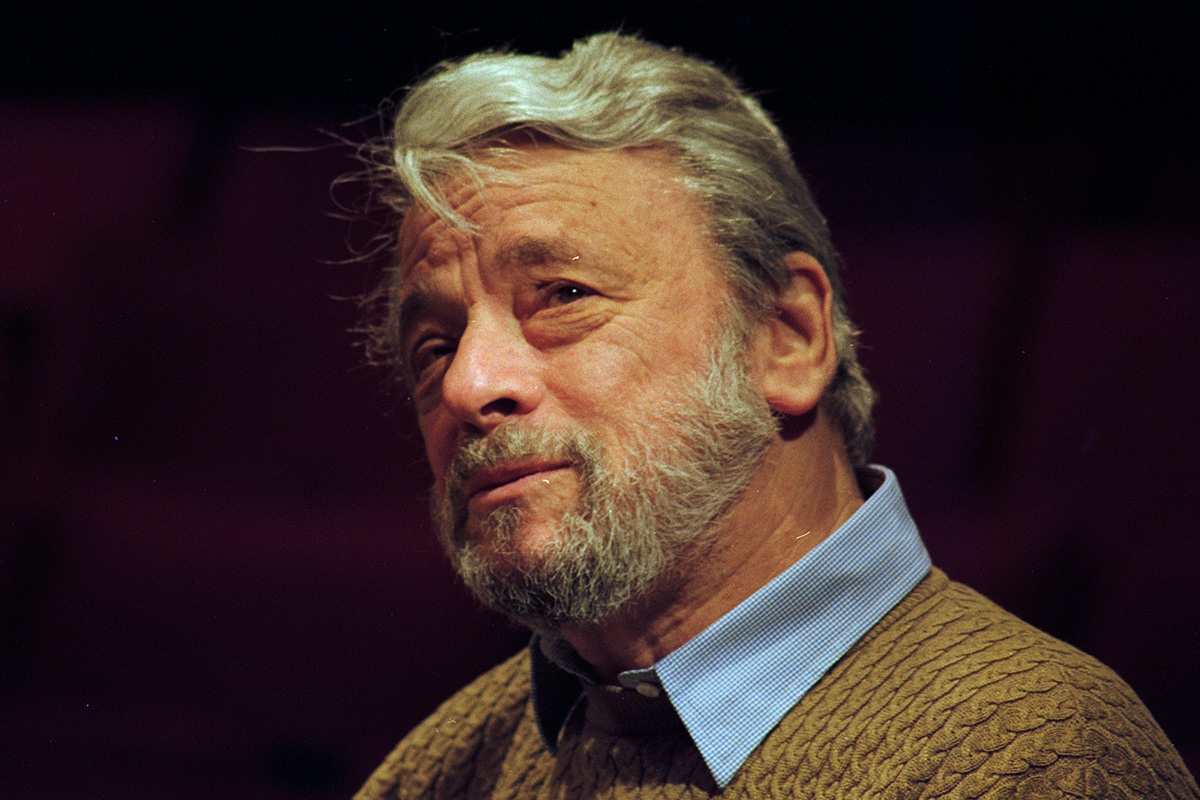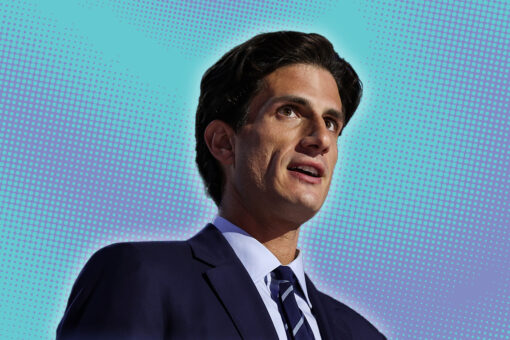For years, I have been morbidly anticipating, fearing, dreading the morning when I’d wake up to the New York Times headline announcing musical theater composer and lyricist Stephen Sondheim’s death. It was around 5:00 PM on Friday, November 26 when I saw the Times phone notification: “Stephen Sondheim is dead at 91.”
I found myself feeling Sondheimian about his death: sorry-grateful. Regretful-happy. The kinds of emotions too complex for a single word to express. My soul started spinning. Something deep inside me immediately fractured at the loss of someone who had such a profound impact on my life.
He was everything to all of us: composers, actors, directors, stage hands, lighting designers, front of house. He was a master of craft. He was prolific, extraordinary, endlessly inventive. Singular.
I’m a Jewish composer and lyricist myself, a musical dramatist; I write about everything that happens in my life. I knew I had to write about Sondheim’s death. But how?
I initially thought there were lots of prickly, interesting questions worth raising about Sondheim’s Jewishness. Despite being born to Jewish parents, he never had any formal Jewish background; despite working in a community largely composed of Jews — commercial New York musical theater— he never overtly addressed his Judaism or Jewish themes in any of his work. But this is an intellectual response — and Sondheim himself was accused of over-intellectualizing as a writer for decades. An intellectual response to Sondheim’s death feels wholly inadequate. This loss is an emotional one.
Is Sondheim’s work actually devoid of his Jewishness — or does his Jewishness manifest in more nuanced ways, slyly finding its way into the poignancy of his music and lyrics? Is there a Jewishness inherent in his work, intended or not?
I think his Jewishness appears in the way that his shows — “Company,” “A Little Night Music,” “Follies,” “Sweeney Todd,” “Merrily We Roll Along” and “Sunday in the Park with George,” to name a few — arrive at conclusions that are simultaneously painful and honest, conflicted and deeply human. Or in the way he rendered his characters — Bobby, Desiree Armfeldt, Buddy and Sally, Sweeney Todd and Mrs. Lovett, Charley and Frank and Mary, George and Dot —truthfully and ambivalently. Is Sondheim’s continual grappling with the complexities of the human condition an expression of his Judaism? One appropriate answer is a lyric in Sondheim’s song “Sorry-Grateful” from “Company”: “Why look for answers where none occur?”
And still, this is all very intellectual: analyzing intent, dissecting characters. As Sondheim knew himself and practiced to exquisite effect, an emotional response makes something meaningful. He elicited feelings through story, so I’ll try to do the same.
I met him once. It was early July of 2014; I was supposed to have participated in the Johnny Mercer Songwriters Project a few weeks prior. I was at a Fourth of July party in New Jersey, hosted by acquaintances who were close friends with Sondheim — the kind of friends who could casually call him “Steve.” Among the other celebrated composers attending the party was Craig Carnelia, one of the Songwriters Project instructors. I took the opportunity to introduce myself to him and to say how very sorry I was that I hadn’t been able to participate; I’d had a bout of food poisoning that prevented me from attending at the last moment. Sondheim, clad in a lilac short-sleeved polo shirt, walked up mid-conversation as I explained my absence.
“What do you think gave it to you?” Sondheim asked.
“Chicken salad,” I replied assuredly, having long since identified the culprit.
“Ah,” said Sondheim, knowingly, “Must’ve been the mayo.”
I extended my hand, praying it wasn’t shaking. “Madeline Myers,” I said, introducing myself.
“Steve Sondheim,” he said in return, firmly grasping my hand in his.
“I’m a composer and lyricist, too,” I said, possibly, probably, certainly bashful. “Your work means… everything to me. Thank you so much for it.”
I wrote to him a few times. Sondheim was known to always respond to emerging writers, and he generously replied to the letters I sent him. I have his responses, and their envelopes bearing his famous Turtle Bay East 49th Street return address, tucked away in a folder of things I save that are special to me. I got those letters out this weekend, looking at them for the first time in years, searching for some kind of posthumous meaning, some wisdom or truth from Sondheim’s typewritten words.
There are things I’d like to ask him now, and I feel foolish for not having written him more recently. As I find myself longing to be farther along than I am in my career, I wish I could ask him: How did you keep going? When it felt impossibly daunting to do so — when critics and reviewers imposed words like “intellectual” and “unhummable” on your work — how did you find your way forward?
I’m struck by the thing we say when a Jew passes away: May their memory be for a blessing. If Sondheim’s memory will be perpetuated in his work— and how lucky we are to have so much of his work — then his memory has blessed us a thousandfold, not only through the work itself, but also through the profound impact it has on writers like me and will continue to have on generations of writers to come. Many of us want to keep writing and telling musical stories because of him. A blessing, indeed.
I’m working on a musical about Jewish scientist Rosalind Franklin, “Double Helix,” in which Franklin looks back on her life. She asks herself: Did I do everything I set out to do with the time I had? I keep thinking that if Stephen Sondheim asked himself the same question, the answer would have to be a huge, resounding yes. And isn’t that the most we can hope for in our lives? We should all be so lucky as to pass away as he did: the day after a Thanksgiving dinner with friends, at age 91, with no prior illness — still writing new musicals, still doing the work that matters to us.
In the second volume of his collected lyrics, Sondheim writes of his desired last words: “If I have the breath to gasp it out dramatically, mine will be a quote from ‘Our Time,’ a song in ‘Merrily We Roll Along’: ‘There’s so much stuff to sing!’”
All I can think to say now is the same thing I said when I met him: “Your work means… everything to me. Thank you so much for it.”



